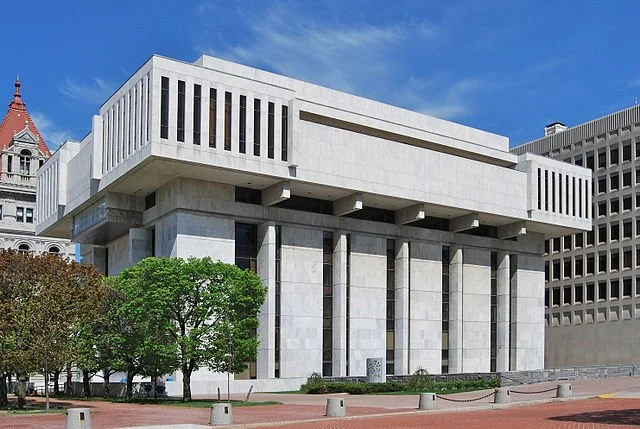Judge recertification lawsuit continues
/The Appellate Division, Third Department, ruled against the Unified Court System’s motion to dismiss a lawsuit regarding the decision not to recertify 46 older judges in 2020. Photo via Wikimedia Commons
By Jacob Kaye
Though four Appellate Division justices had their lawsuit against the Office of Court Administration and its leaders dismissed last month, the legal battle over the controversial decision not to recertify a group of older judges in 2020 continued this week.
Justices in the Appellate Division, Third Department denied a motion from Administrative Board of the Unified Court System Monday, in which the UCS argued the lawsuit brought against them by a group representing New York Supreme Court justices was moot because some of the justices affected by the austerity measure were rehired.
The Appellate Division decision, siding with the Supreme Court Justices Association of the City of New York, ruled against the argument that was successful in a related lawsuit in December.
President of the Supreme Court Justices Association of the State of New York and Queens Supreme Court Justice Carmen Velasquez celebrated the court’s ruling on Tuesday, though she maintained the fight is not over.
“I have to be cautiously optimistic,” Velasquez said. “But I'm certainly grateful that the judges were able to see and take one case at a time, they don't just put it in a pile [together].”
The lawsuits center around the court’s decision to cut 46 judges over the age of 70 who were applying for recertification in 2020. Facing budget cutbacks during the first year of the pandemic, the Administrative Board and Chief Administrative Judge Lawrence Marks defended the decision as an “extremely difficult but necessary determination” that would save around $55 million over the next two years.
State law requires that Supreme Court justices apply for recertification and undergo cognitive exams every two years after turning 70. Judges are required to retire at the age of 76.
Two lawsuits sprung up surrounding the decision – one brought by the association and the other by four individual judges, including Appellate Division Judge Sheri Roman, a former Queens judge.
In the lawsuit brought by the individual Appellate justices, Roman and her colleagues alleged that the OCA, Chief Judge Janet DiFiore and Marks had committed age discrimination.
In the first months of 2021, the court’s budget was restored and the OCA asked the cut judges to reapply for certification – an action a large majority of them took. Only around half of the original 46 judges took to the bench in the summer of 2021.
Because the justices were given the opportunity to reapply, and because some of them returned, including Roman and Judges David Friedman and Ellen Gessmer, who also signed onto the lawsuit, the Administrative Board entered a motion to dismiss the case. The Court of Appeals granted the motion in December.
The argument, which said that “no live controversy exists between the parties” as a result of the rehiring, wasn’t as successful in the case brought by the Supreme Court Justices Association of the City of New York and the Supreme Court Justices Association of the State of New York.
“We're very happy that the court is going to be able to review the merits of the appeal and we're hoping that our point gets sustained,” Velasquez said.
A spokesperson for the OCA declined to provide comment for this story.
As the legal battle continues, the Supreme Court Justices Associations are continuing their fight to pass a bill that would make judge recertification nearly automatic.
The bill, sponsored by State Senator Brad Hoylman and co-sponsored by Queens Senators Leroy Comrie, Michael Gianaris and John Liu, among others, was delivered to Governor Kathy Hochul on Dec. 30, and is now awaiting her signature.
If the bill is passed into law, one word of the state’s judicial law would be changed in a way that the bill’s supporters say would make judge recertification essentially automatic.
The state’s judiciary law currently states that judges over 70 years old “may” be recertified if they’re proven to be mentally and physically fit and if there is a need for them on the bench. If the bill is signed into law, it will be amended to read that judges “shall” be recertified if they meet both qualifications.
The bill was drafted and introduced in the legislature soon after the decision to not recertify the judges.
“Hopefully this [lawsuit] will give a message to the governor that we definitely need the bill to be signed,” Velasquez said.




